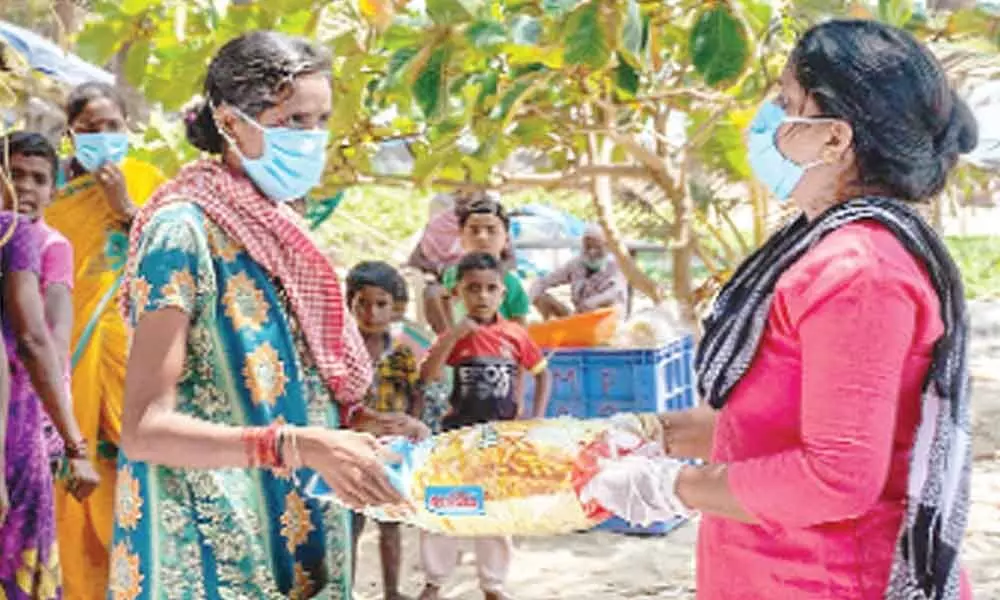Live
- AAP releases first list of 11 candidates for Delhi Assembly elections
- District Collector Adarsh Surabhi wants disabled people to be inspired by the perseverance and hard work of the disabled
- Jupally, Seethakka inaugurate Third Island in Laknavaram Lake
- Chittoor police bust interstate robbery Gang
- Expedite Vizag-Chennai Industrial Corridor works says Collector S Venkateswar
- Chandrababu speaks on High Court Bench in Kurnool, says ready to develop state
- 3-day training to visually challenged students concludes
- iPhone SE 4: Launch with New Features Expected in March 2024
- Sri Vishnu students to take part in South Zone Games
- Cordon & Search: Vehicles without records seized
Just In
The role of NGOs in combating Covid-19 pandemic


The role of NGOs in combating Covid-19 pandemic
In the very first week that India entered the lockdown in March 2020 to curb the novel coronavirus disease (Covid-19) pandemic, Prime Minister...
In the very first week that India entered the lockdown in March 2020 to curb the novel coronavirus disease (Covid-19) pandemic, Prime Minister Narendra Modi called on non-government organisations (NGO) to help the government — by providing basic necessities to the underprivileged, by supplying medical and protective gear and assisting with awareness campaigns on social distancing.
The NITI Aayog reached out to more than 90,000 NGOs and civil society organisations (CSO) in the first week of May, seeking assistance in delivering services to the poor as well as health and community workers.
The Supreme Court, on a similar note, applauded the contribution and role played by NGOs in coming forward to help migrant workers by providing food, water and transport during the difficult time.
Development experts believe it is crucial to understand that it would not have been possible for the government alone to holistically address the pandemic — develop, implement and ensure that measures reached the needy, last-mile people.
To add to its reach and resources, the government needed the civil society, non-government and community organisations to spearhead its initiatives with their extensive reach and large volunteer-base embedded in the community — as the PM rightly observed.
António Guterres, the secretary-general of the United Nations, also praised civil society and grassroots organisations for the fundamental role they played in fighting COVID-19 at local levels, as he highlighted in the recent Report on the socio-economic impact of COVID-19. NGOs, according to him, bring economic and livelihood opportunities and can adapt responses to the community context.
'Impact of COVID-19 on India's non-profit organisations' — a snapshot report released by the Centre for Social Impact and Philanthropy (CSIP), Ashoka University, in June 2020 — revealed:
"Three-fourths of the interviewed NPOs were actively engaged in ongoing relief work, using their embedded presence in communities as a particular strength.
This work ranged from last-mile delivery of relief material such as dry ration and sanitation kits, community awareness and sensitisation, setting up health camps and isolation facilities, rescuing stranded labour, provision of direct cash transfers, to offering rehabilitation of the distressed communities."
Voluntary Action Network India (VANI), in its recently published 'Study Report on National Policy on Voluntary Sector', observed:
"In a country like India, the voluntary sector bridges the gap between the government and the population of the country. It identifies the needs of the community and provides its support and services, even in the most untouched and marginalized areas, where the government is not able to reach."
This World NGO Day (February 27), with all humility, we celebrate achievements of the flag-bearers of sustainable development and social change. The gritty efforts of the CSOs and NGOs become all the more significant, if we keep in mind the fact that they themselves have been reeling under a huge economic stress impacted by the pandemic.
In the wake of this deadly pandemic and the lockdown induced by it, our first thoughts were about how to reach out to our children and their communities. Topmost in our minds were the remotest regions of our operational areas and urban slums, their survival, safety and their health.
Therefore, during the lockdown period, CRY's efforts, along with its partner NGOs, have been concentrated on reaching all households as far as possible, with basic health and hygiene kits for the children and their families.
We also focused on our awareness generation and advocacy programmes with our target communities and local government bodies, primarily through occasional home visits and mainly through phone calls and messages, in keeping with the social distancing protocols.
CRY has been spreading awareness, distributing relief materials and advocating for the access and availability of services to the communities and children.
Awareness-building programmes covered topics like social-distancing, best practices related to public health and hygiene and behaviour change, sanitization, use of face masks, following government guidelines during the lockdown period and ways to protect people from community spreading of the epidemic.
As part of the awareness programme, children created posters, wall paintings and short videos on hand washing, social distancing and wearing masks.
There is no doubt that the grit and resilience shown by the civil society crusaders against Covid-19 is paramount. Though we are yet to see the end of the pandemic, it is key that the civil society organisations collaborate with the government in a constructive and meaningful way to build back better, and enhance India's preparedness to face any threat on the development of its society and people.
(Courtesy: Down To Earth)

© 2024 Hyderabad Media House Limited/The Hans India. All rights reserved. Powered by hocalwire.com






